Ultimate Electrolyte Supplements Guide: Do You Need Them?
Author:
Reviewed by:
(Certified Nutritionist, S&C specialist, M.Sc.Eng. Biotechnology)
Unlock your full potential by engaging with our experts and community! Have questions about your fitness journey or looking for expert advice on weightlifting techniques? Don’t hesitate — leave a comment below and Oleksandr Maksymenko will provide a personalized answer and insights to help you reach your goals.
Torokhtiy is reader-supported. Some links are affiliate links, and we may earn a commission at no extra cost to you. See our disclosure page for details.
Think about that feeling of being completely drained after a tough workout or even a long day in the sun. That’s what happens when you’re low on electrolytes that keep your body functioning smoothly. They also regulate muscle contractions, keep you hydrated, and balance your pH levels.
There’s a lot of electrolyte supplements out there and, in theory, they work great; they’re like a quick pick-me-up when you get exhausted, so what’s not to like? But do they really work like that in practice and do you need them?
It’s a topic that absolutely needs to be discussed, and that’s what we’re getting into today!
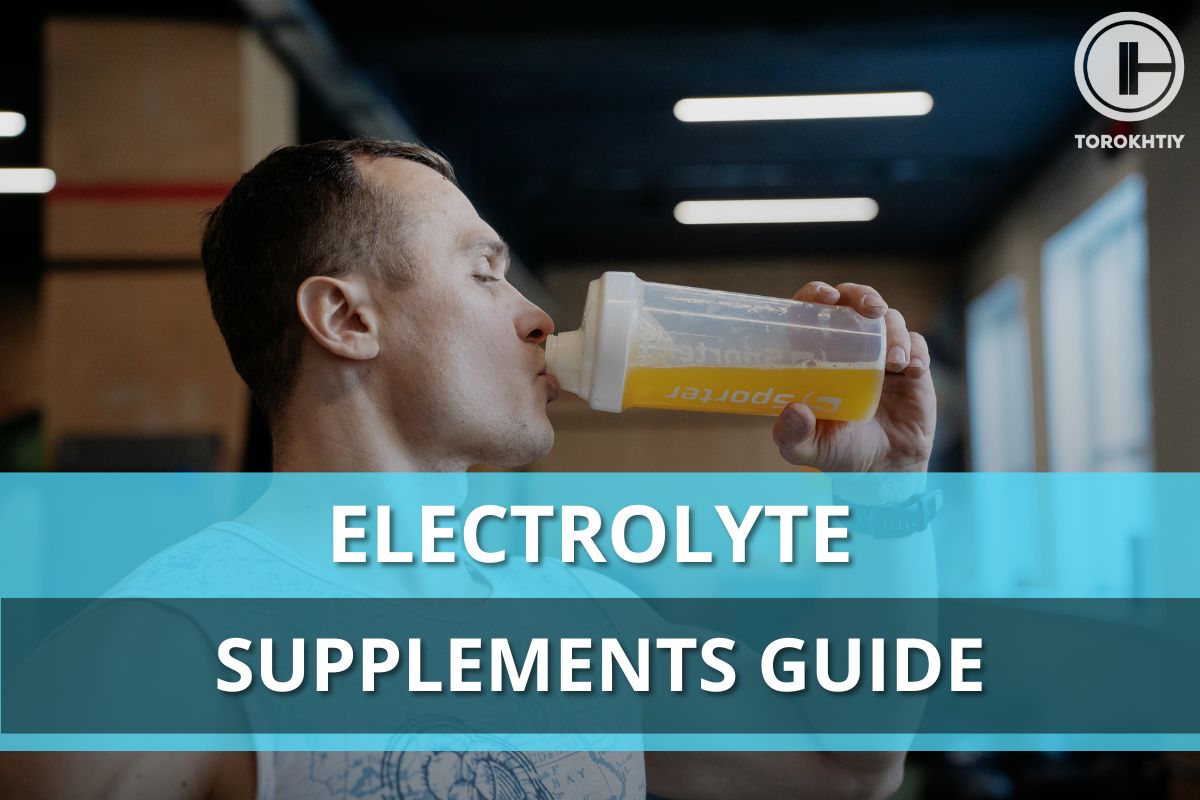
What Are Electrolytes and Why Are They Important?
Electrolytes are chemicals that perform many functions in our body, including maintaining fluid balance and hydration, as well as transmition of electrical impulses in neurons and muscles. For example, sodium, calcium, and potassium help our muscles contract. Living systems contain many electrolytes, but only 6 of them are the most important in the context of supporting the functions of our body.
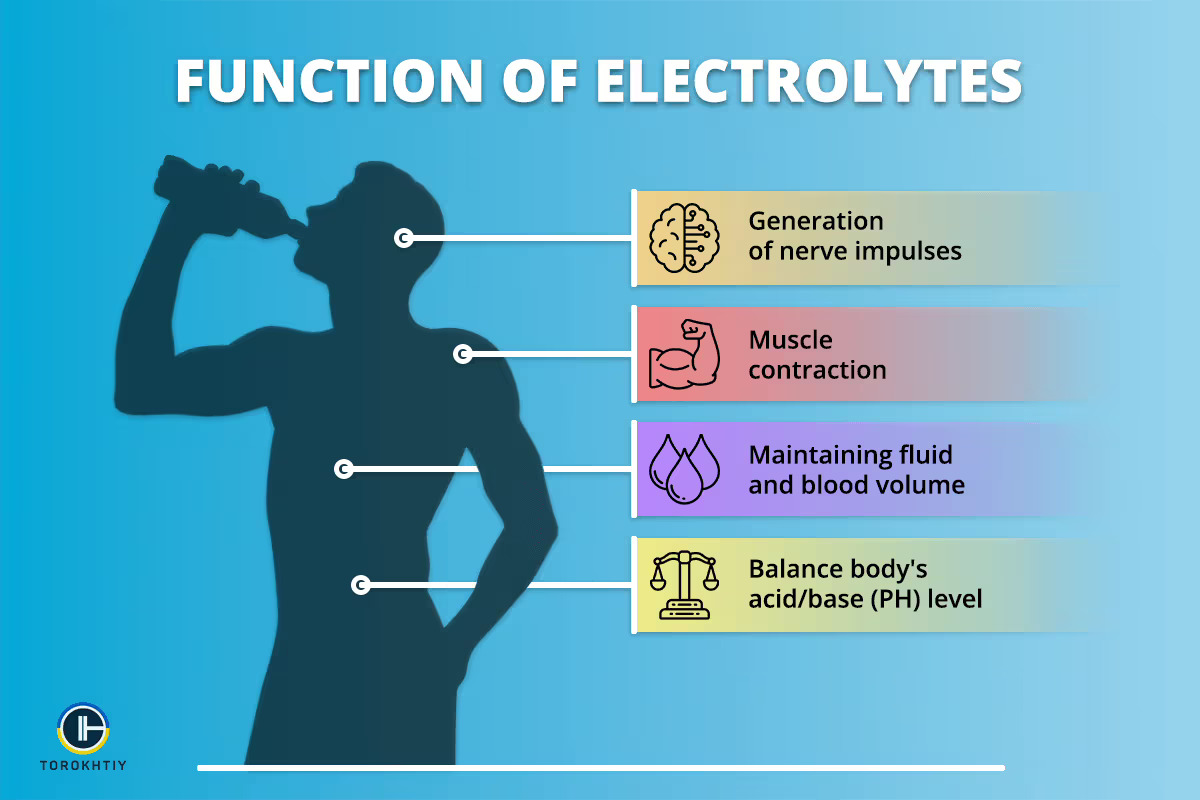
Electrolytes are lost through sweat during prolonged physical exertion, so the general idea of taking this type of supplement is to restore their losses. At least, the manufacturers of these supplements want us to think so. However, in reality, it makes sense to consider electrolyte supplements only for certain subgroups of the population, which I will talk about below.
By the way, in case you are looking for electrolyte vitamins. This makes no sense, because despite the fact that some vitamins take part in the conduction of nerve signals (for example, thiamine or vitamin B1), they are not electrolytes. It is the minerals that carry an electric charge.
What Is Exercise-Associated Hyponatremia and Why Are Electrolytes Involved?
An electrolyte that receives special attention in scientific literature is sodium, with a special emphasis on athletes who train for ultra-endurance or engage in other sports (for example, team sports), when training is prolonged, high-intensity, and takes place in conditions of heat and / or high humidity.
In these sports and especially under such environmental conditions, sweat losses can be sufficient to cause excessive water / electrolyte imbalances.
Obviously, athletes (as well as the average fitness enthusiast) drink water to prevent dehydration.
However, when athletes consume too much fluid (when water intake exceeds sweat loss), conditions are created for a decrease in sodium concentration in the blood (sodium can be diluted). If this happens, a dangerous condition called exercise-associated hyponatremia may develop. This is a potentially fatal condition.
Our expert Jacek Szymanowski added:
“Drinking too much water can kill.“
However, do not rush to diagnose yourself with hyponatremia and order an electrolyte supplement! Many manufacturers of these products build too much hype, describing electrolytes supplements in such a context as if they are actually necessary for the average fitness enthusiast.
The fact is that hyponatremia is only common among people who exercise for many hours in a row and drink hypotonic drinks in quantities that exceed sweat losses.
Therefore, if you’re the average fitness enthusiast, or a short distance runner, or just don’t train intensely for hours in a row (especially in heat and/or high humidity), you don’t need this type of supplement at all!
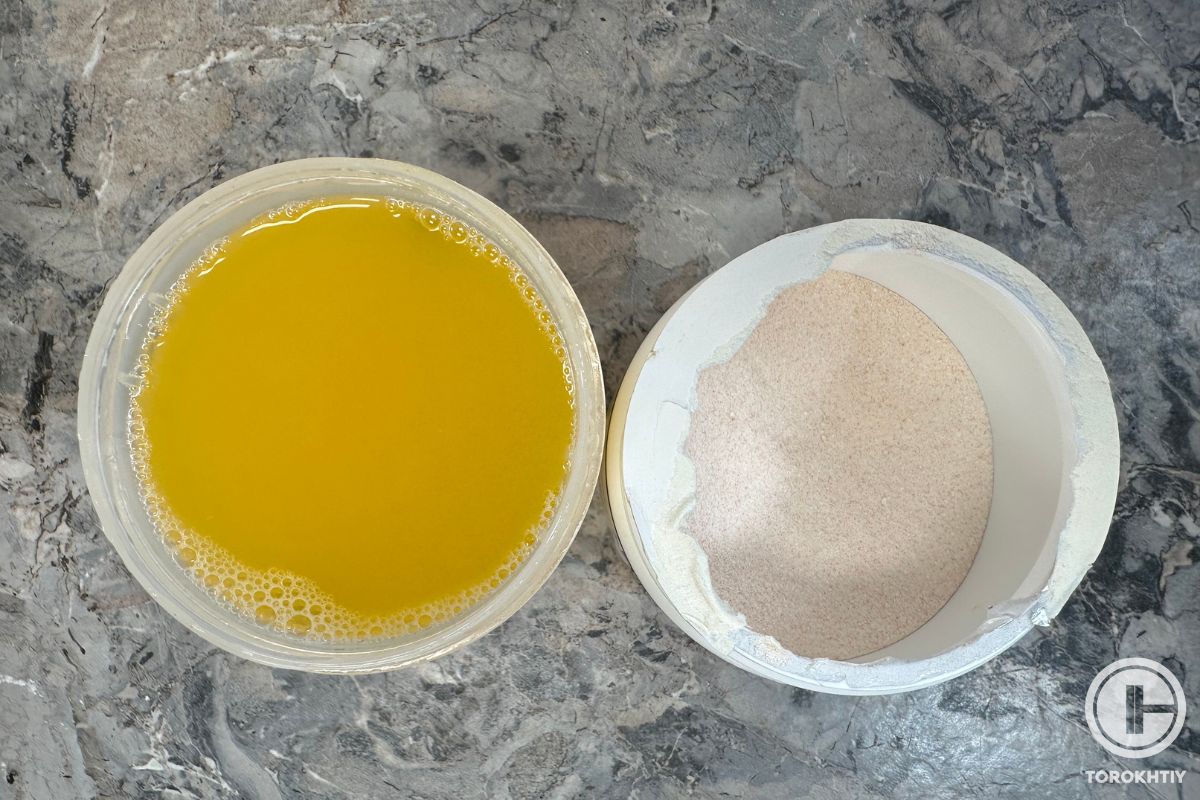
In What Situations Are Electrolyte Supplements Actually Needed?
Since hyponatremia was mainly observed during or after prolonged physical exertion for 4–6 h or longer, it is in these cases that the addition of an electrolyte mix into routine is the most justified. However, it is important to understand that the key risk factor for hyponatremia is excessive fluid intake (including sports drinks, water, and other hypotonic to plasma solutions) that exceeds fluid loss through sweat.
Yes, sodium in an electrolyte supplement that can attenuate the fall in blood sodium concentrations. But since such drinks usually contain a lower concentration of sodium compared to plasma, the protective effect of sodium in these types of supplements is still insufficient in conditions of excess fluid consumption.
For these reasons, first priority should be given to fluid intake before, during and after prolonged exercise, rather than electrolyte supplements.
Jacek Szymanowski further mentioned:
“Drinking coffee does not dehydrate you.“
In general, the use of electrolyte supplements appears to be justified for very long bouts of exercises (from 4 hours or more). However, there may be exceptions. According to this scientific paper, adding sodium to the drink is justified in case of large sweat losses even when the exercise lasts 2 hours.
For example, if you are an American football player, or a military or police officer, who trains for 2 hours in the heat and loses a big amount of sweat (especially if the sweat tastes salty and leaves white marks on clothes), electrolyte supplements can still be useful.
I want to pay special attention to American football players. They have a lot of muscle mass, often practice in hot temperatures, wear protective clothing (which not only makes evaporation more difficult, but also adds weight) and perform a lot of explosive physical work.
And the more force is produced, the more heat is produced! All this creates conditions for extremely high sweat losses. Therefore, for some sports, even if training lasts less than 4 hours, additional electrolytes can still be useful.
According to data for sweating rate and sweat sodium loss in athletes, American football players, along with endurance athletes, lose the most sweat and sodium per hour of exercise. Not all sports are represented in this analysis, but American football players are the most comparable to endurance athletes in terms of sweat and sodium losses per hour of exercise.
Moreover, if American football players have two-a-day practices in hot August, it greatly increases the importance of replenishing lost sodium stores!
Jacek Szymanowski Interesting fact 3:
“Research shows that, when people doing intense exercise rely on thirst alone, they tend to under consume fluid, replacing around half of what they lose.“
In general, given the fact that there is still no consensus regarding the sodium replacement during exercise, I suggest considering 2 hours of continuous exercise as the minimum threshold after which electrolyte supplementation can be really justified.
First of all, this applies to people who train intensively in conditions of high temperature and / or humidity, while losing a huge amount of salty sweat.
In any case, even in situations when electrolyte supplements may be needed, a personalized plan of fluid intake is needed first. Remember that the most common cause of exercise-induced hyponatremia is excessive fluid intake!
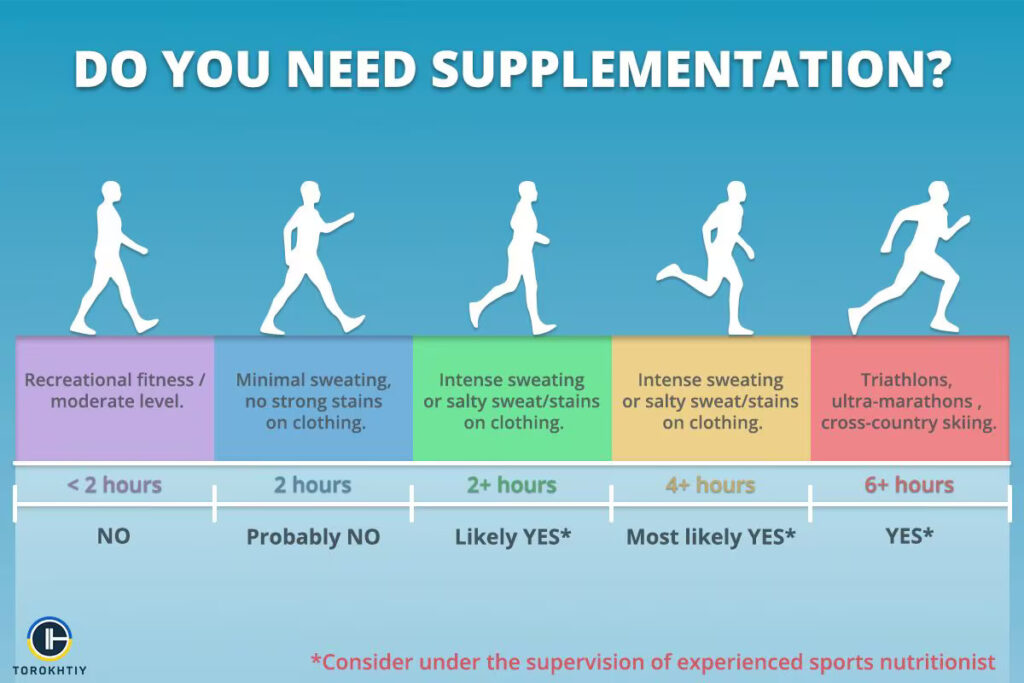
When Might the Use of Electrolytes Be Justified for the Average Gym Goer?
In my opinion, the only real reason to use an electrolyte mix for those who train for less than 2 hours, including the average fitness enthusiast, is reluctance to drink plain water during exercise due to the lack of taste. If you want to improve the palatability of plain water, then you can use an electrolyte mix.
However, in this case, you don’t need supplements with a lot of sodium per serving. You can either use supplements with the lowest amount of sodium per serving (say, 100-130 mg), or use only a third or fourth of the recommended serving size if it contains 500 mg of sodium or more.
For example, HYDRATE from Transparent Labs can be used this way. In this case, you can stretch one package for many weeks or even months!
Our expert Jacek Szymanowski stated:
“If you need fuel get one with carbs, if you don’t get electrolytes without kcal. My personal choice – ISOSTAR! It doesn’t have potassium in it, but it does contain a significant amount of carbohydrates, and when you use it properly it becomes an actual isotonic – not hypo/hypertonic – which hydrates you well. So when it comes to electrolyte powder I’d make sure I can (they provide instructions how to) prepare isotonic drink.”
In the powdered form they don’t use aspartame – which I don’t like personally. The taste of orange and fresh is fucking awesome and that is why I’m biased haha.😀”
Why Is It Impossible to Develop Clear Recommendations for the Use of Powdered Electrolytes?
It is extremely difficult to provide a single one size fits all recommendations or even rough guidelines for adequate fluid and electrolyte intake (with particular emphasis on sodium) for athletes. The fact is that the loss of fluid and electrolytes (sodium) and, accordingly, the need for their replenishment are influenced by many different factors.
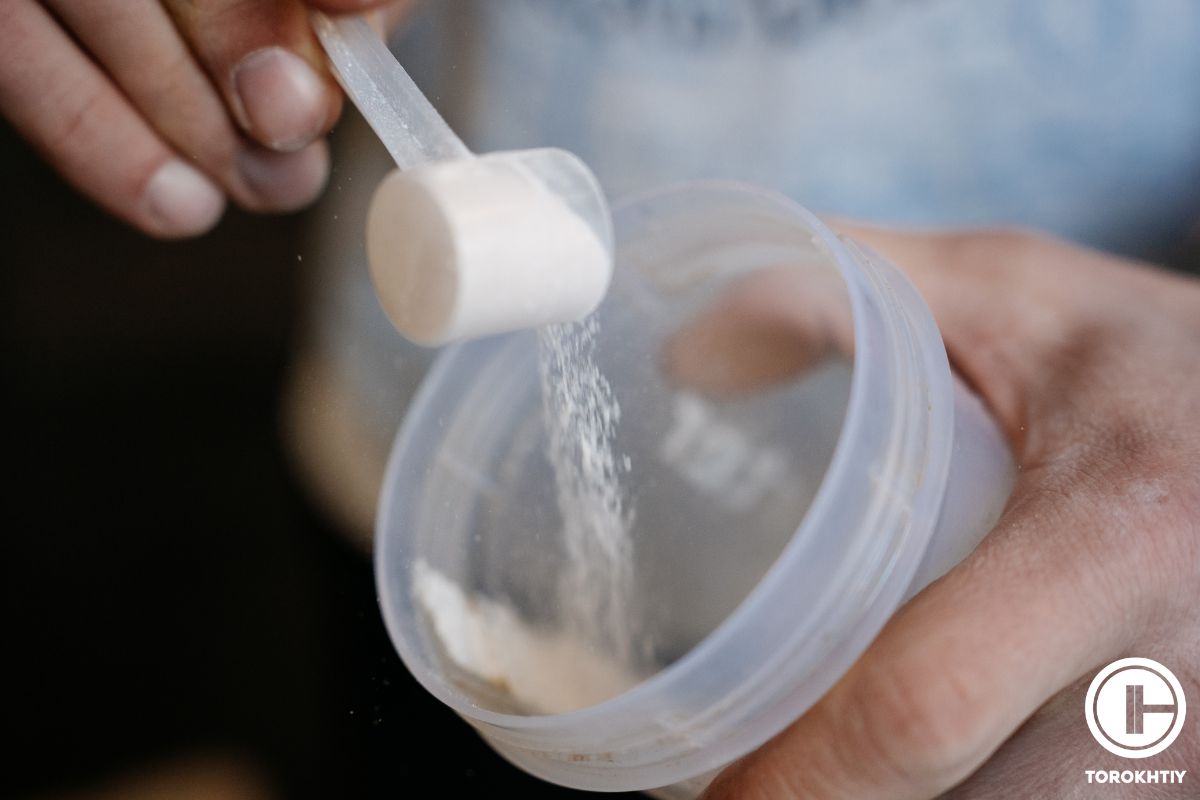
1. Duration and Intensity of Exercises
The longer and more intense the exercise, the more sweat we lose. The level of physical readiness for the specific type, intensity and duration of exercise also affect sweat and sodium losses.
2. Individual Variability in Sweat and Sodium Losses
The degree of sweating and loss of sodium in sweat varies greatly between individuals. For this reason all estimates regarding average sweat and sodium losses per hour are not very practical, because due to the large individual variability in the degree of sweating and sodium losses, the fluid intake protocol and the feasibility of using electrolytes must be considered for each individual athlete.
3. Environmental Conditions
In conditions of high temperatures and/or high humidity we lose more sweat. Great cold can also be a risk factor for the development of hyponatremia, especially in the USA.
Even the degree of acclimatization affects sodium balance. Sweat glands reabsorb sodium, and heat acclimatization improves this ability. Therefore, heat acclimatized individuals lose less sodium with sweat for any given sweating rate.
4. Clothes and Equipment
One of the most striking examples is American football players, who wear protective clothing, which only further contributes to profuse sweating and loss of electrolytes.
5. Considering All Factors Together
In the end, all the factors listed above must be taken into account when developing an appropriate protocol for fluids and electrolyte intake for an individual athlete.
It is necessary to take into account duration and intensity of exercises, individual sweating rate, as well as the temperature, humidity, degree of acclimatization (if necessary) and other factors of the individual athlete. For example, fluid and supplemental sodium requirements for the same athlete running the same distance but in different climates can be very different.
Average gym goers or people who engage in recreational fitness should consider the recommendations for salt / sodium intake for adults. The American Heart Association does not recommend more than 2,300 mg of sodium per day. So if you want to add an electrolyte supplement to your workout drink, you need to consider the amount of sodium!
So don’t be surprised when I say that hydration and electrolyte strategies before, during, and after exercise should be developed and customized for an individual athlete under the guidance of a sports nutritionist who has deep knowledge in sports science. Carbohydrates should be taken into account as well, which are also an important part of the overall rehydration and refueling plan for endurance and ultra-endurance athletes.
The funny thing is that the average fitness enthusiast who doesn’t exercise in the heat for several hours shouldn’t be Googling “best hydration packets” at all. However, many manufacturers of this type of supplement try to justify their use for this subcategory of the population.
At the same time, amateur or professional athletes who train for many hours (especially in conditions of heat and large losses of “salty” sweat) should contact a professional sports nutritionist to develop a personalized plan for rehydration and restoration of electrolyte balance.
Moreover, the symptoms of Exercise-Associated Hyponatremia can be confused with the symptoms of heat exhaustion and other conditions, so self-diagnosis and self-treatment can be dangerous, because different conditions may require completely different methods of treatment.
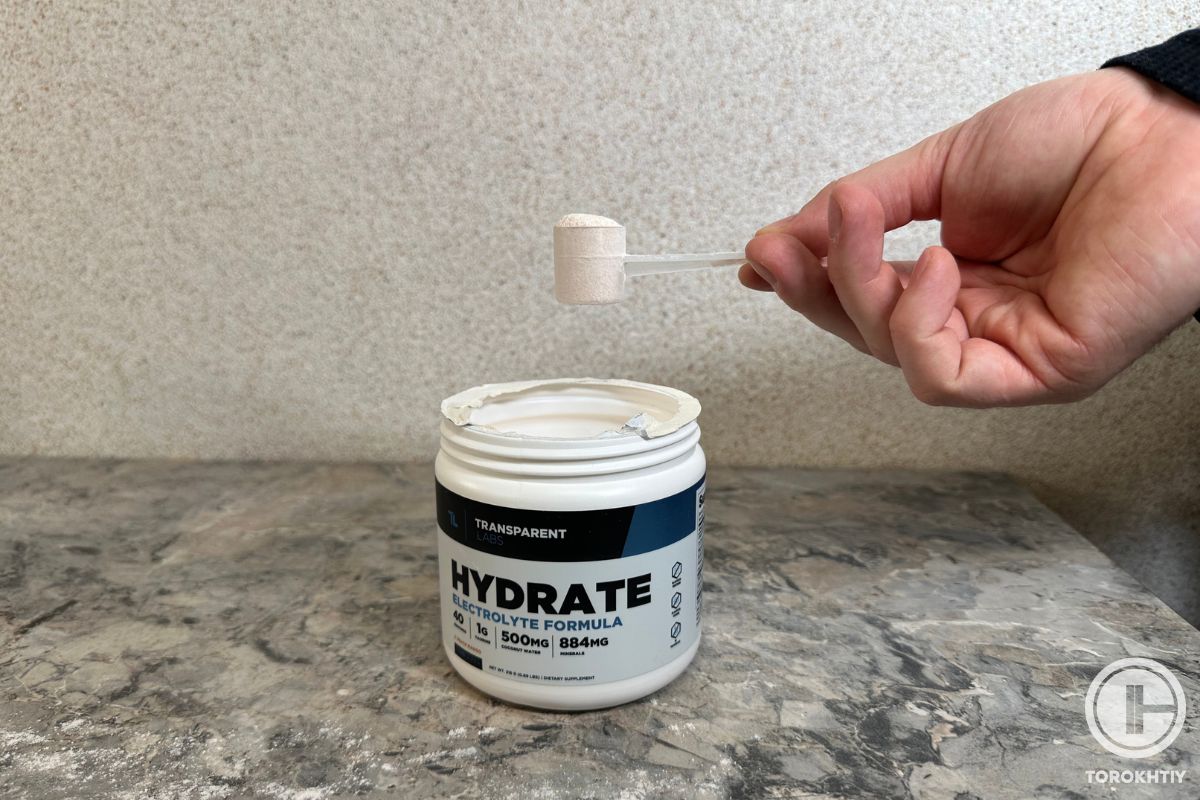
How to Choose the Best Electrolyte Powder When It Can Actually Be Useful?
Hyponatremia is not something to play around with. On the other hand, using electrolytes (especially with high sodium per serving) without understanding all of the factors listed above also has its risks.
Therefore, the best and safest decision when choosing this type of supplement is to consult with a sports dietitian who will take into account all the details and create an individualized plan for hydration and replacement of lost electrolytes (if necessary).
It is extremely difficult to give generalized and universal recommendations. However, below I will list some key points to help you better navigate this type of supplement.
1. Amount of Sodium per Serving
Key attention should be paid to the sodium content per serving. This will allow you to choose the necessary concentration of sodium per liter of liquid when you need to mix such a drink.
The difficulty lies in the fact that for each individual task, a different amount of sodium may be required in a different ratio to the volume of liquid. For example, hyperhydration may be necessary prior to the start of a prolonged event in which large sweat losses are expected, but cannot be practically replaced.
In this case, an extremely high concentration of sodium in the pre-event drink (as close as possible to the plasma concentration) may be required. In another situation, when pre-exercise hyperhydration is not required, but the athlete consumes a drink during exercise, the sodium concentration in the beverage should be much lower.
Therefore, I emphasize once again that you should not play with electrolyte supplements without expert supervision.
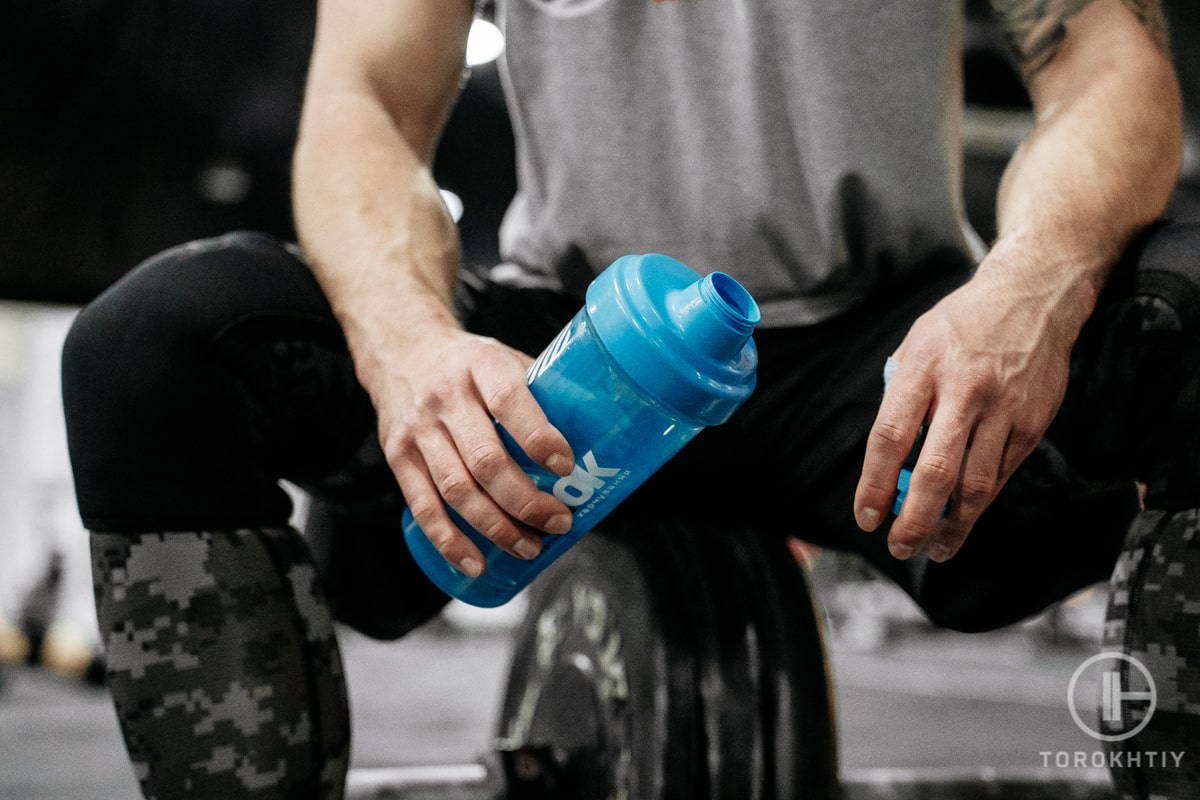
2. The Presence of Carbohydrates
Sports drinks and electrolyte supplements should be separated. The former usually contain a significant amount of carbohydrates per serving, as well as electrolytes, but in a lower concentration. This type of supplement allows not only rehydration due to fluid and electrolytes, but also to refuel due to a significant amount of carbohydrates (although there are also low-sugar or sugar-free options).
They are a quick source of fuel to maintain physical performance during exercise, especially when they last 1 hour or more. Electrolyte supplements, on the contrary, may contain 4 times higher concentration of electrolytes, but less carbohydrates. Look at the picture below.
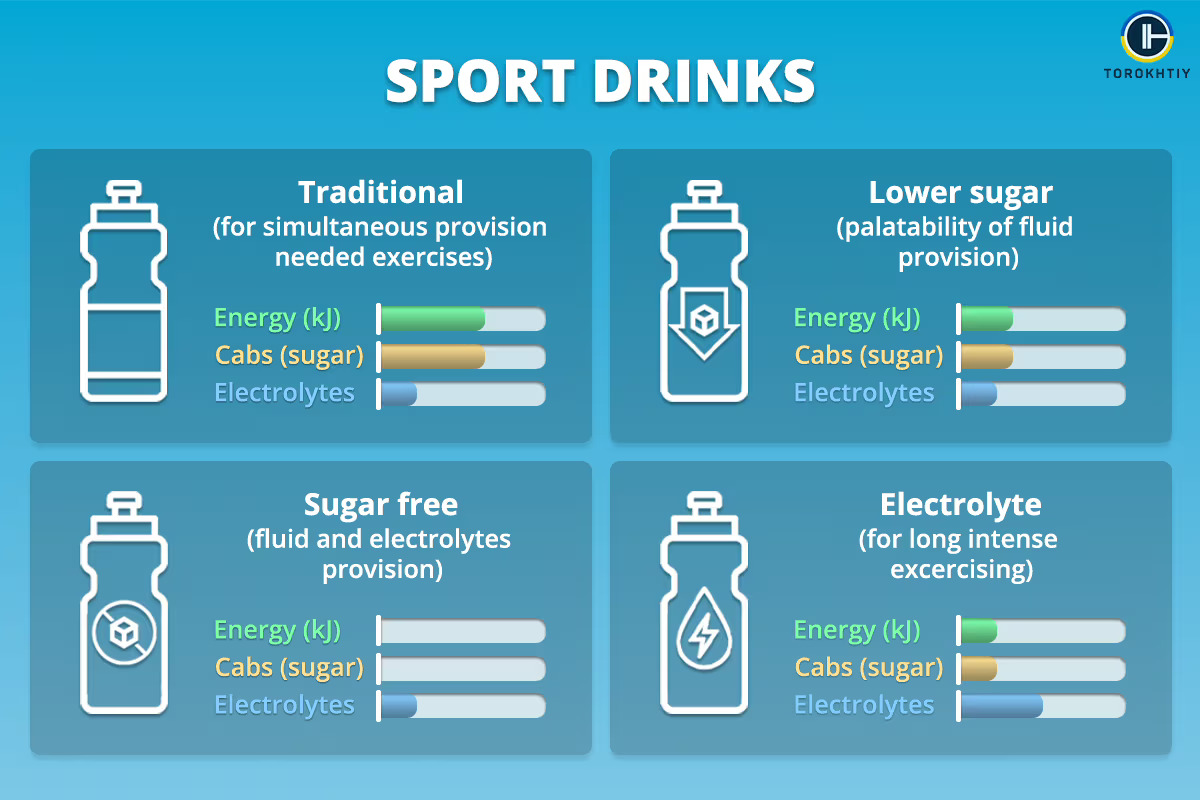
- Traditional sports drinks – for exercises that require the simultaneous provision of a significant amount of carbohydrates, fluid and electrolytes.
- Lower sugar sports drinks and “Sugar free” drinks – to provide palatability of fluid. Mainly provide fluid and electrolytes.
- Electrolyte drink – for targeted replacement of fluid and electrolytes (particularly sodium and potassium) along with large sweat losses (especially “salty” sweat), as well as for special tasks (for example, hyperhydration before prolonged exercises or restoration of moderate-large fluid deficits that occurred during exercises).
Jacek Szymanowski personal tip:
“Instead of plain water, get an electrolyte beverage (or sports drink, if you train intensively for more than 1 hour and you need carbohydrates). Water with honey, salt and lemon will work as well.”
The average fitness enthusiast usually does not understand the difference between these types of supplements. For this reason, on various online stores, you can find reviews from dissatisfied users regarding the presence of added sugar in the electrolyte supplement they purchased.
However, each of these supplements has its own purposes. Therefore, it is necessary to understand exactly what type of product you need and study its composition before buying.
This electrolyte powder review features both electrolyte supplements (without or with a small amount of carbohydrates per serving) and powders that contain a significant amount of carbohydrates and are suitable for the role of sports drinks.
3. Taste and Saltiness
Drinks with a too high concentration of sodium do not taste very good and therefore can prevent the desire to drink during prolonged exercise bouts. Therefore, with the help of a sports nutritionist, it is important to find a balance between the restoration of lost fluids and electrolytes in such a way as not to harm either physical performance or health.
Hydrate by Transparent Labs
- Form: Powder
- Flavors: Tropical Punch, Peach Mango
- Key Ingredients: Calcium, Magnesium, Sodium, Potassium
- Additional Ingredients: Coconut Water Powder, Taurine
- Package Information: 304g
- Servings: 40
- Price Per Serving: ~$0.75
- Company Founded: 2012
- Recommended by athletes: Paul Sklar, Hafþór Júlíus Björnsson
Considering the amount of sodium per serving and the guidelines from the Australian Sports Commission on sodium replacement during exercise, we highly recommend HYDRATE from Transparent Labs. For ultra-endurance athletes, 500 mg of sodium per liter of fluid falls into a good range for maintaining the balance between preserving thirst drive and palatability of electrolyte mix.
The Australian Sports Commission recommends mixing 500-700 mg of sodium per 1 liter when using electrolytes drinks during prolonged exercises. Given the fact that during very long training sessions with profound sweating, it is important to prevent dehydration, this ratio is much more optimal and practical. Also, this ratio of sodium to water will reduce the risk of gastrointestinal problems.
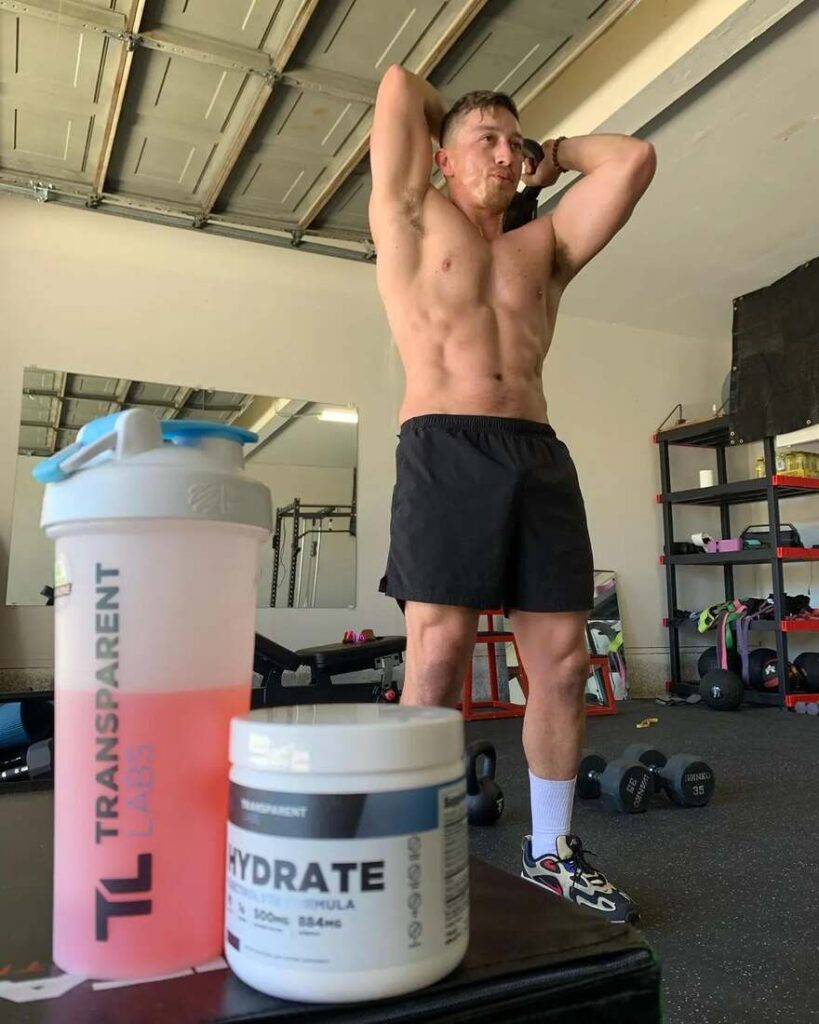
Given the composition of electrolytes per serving, HYDRATE can be great for triathletes, ultra-marathoners and other athletes who train for hours and sweat a lot, especially in conditions of hot and / or humid weather.
FAQ
Is It Ok to Drink Electrolyte Powder Everyday?
In general, it makes sense to take this type of supplement only on days with long and intense exercise bouts. Also, electrolytes can be used several days in a row if you are running multi-stage ultra-marathons. For the average gym-goer, daily use of this supplement is useless.
A possible exception would be to add a small amount of powder to plain water to improve palatability and thus force yourself to drink more fluids, especially if you live in a hot climate with high humidity.
What Are the Negatives of Electrolyte Drinks?
There are several possible disadvantages: unnecessary expenses; reducing the drink’s palatability and gastrointestinal symptoms due to excess sodium in the drink; the risk of developing hypertension in susceptible people (especially due to the use of electrolyte supplements by people engaged in recreational fitness).
It is important to understand that the electrolyte needs of the average person who trains for 1-1.5 hours in a temperate climate (or indoors) and athletes who train for 2 or more hours in hot and/or humid conditions, losing huge amounts of sweat and sodium, are very different.
Can Drinking Too Much Water Cause Low Electrolytes?
In fact, excessive fluid intake during prolonged exercise is considered a key factor that increases the risk of developing exercise-associated hyponatremia. Therefore, first of all, you need to have an individualized protocol for drinking water before, during and after prolonged exercises.
What Is the Best Form of Electrolytes to Take?
This type of supplement is available as a powder, tablets, ice blocks or ready-to-drink beverages. The optimal form should be chosen depending on the specific task and period (before, during or after the event), as well as the type of sport.
Different forms and different concentrations of electrolytes can be used for hyperhydration before exercise in hot environments (before the start of the event) or for rapid rehydration after an exhausting and prolonged event.
At the same time, not all forms are suitable for use during sport events. For example, for cyclists, the most convenient form would be a ready-to-drink electrolyte beverage or a powder from which such a drink can be pre-mixed. Whereas for athletes who have the opportunity to take a break, tablets may also be suitable.
Conclusion
Electrolyte supplements can be used during prolonged exercise lasting 4 hours or more. Also, their use can be considered during training bouts lasting 2 or more hours in conditions of high exercise intensity, heat and large losses of salty sweat. For people who fall into these categories, it is important not to drink too much fluid during exercise to minimize the risk of hyponatremia.
If you are the average gym goer exercising for less than 2 hours, the only reason to consider this type of supplement is to improve the taste of plain water. However, in this case, you need to choose products with a low dosage of sodium per serving (for example, ~100-150 mg of sodium), or reduce the serving size of powder specified by the manufacturer.
Make sure to look for products with a good balance of key minerals and minimal additives. If you’re unsure about your electrolyte levels or if you’re dealing with a health condition, we recommend speaking to a doctor to stay informed and protect your health.
Do you use electrolyte supplements? Share your impressions in the comments!
Also read:
- Ashwagandha For Athletes
- Nitric Oxide Supplements Guide
- Best Post Workout Drink
- Powerlifters Diet
- Eaa vs Bcaa
- Best Sports Drinks
- How to Rehydrate Quickly
- water.io Smart Water Bottle Review
References:
- Eleftherios Veniamakis “Effects of Sodium Intake on Health and Performance in Endurance and Ultra-Endurance Sports” Int J Environ Res Public Health. 2022 Mar; 19(6): 3651.
- AIS “Electrolyte supplement” https://www.ais.gov.au/nutrition /supplements/group_a (accessed August 30, 2023).
- Pasquale Strazzullo “Sodium” Adv Nutr. 2014 Mar; 5(2): 188–190.
- Margaret Ashwell “Stevia, Nature’s Zero-Calorie Sustainable Sweetener” Nutr Today. 2015 May; 50(3): 129–134.
- AIS “Ais Sports Supplement Framework” https://www.ais.gov.au/__data /assets/pdf_file/0006/1001103/ Electrolytes-Infographic.pdf (accessed August 30, 2023).
- Open Educational Resources “Electrolyte Balance” https://open.oregonstate. education/aandp/ chapter/26-3-electrolyte-balance/ (accessed August 30, 2023).
- NIH “Thiamin” https://medlineplus.gov/ ency/article/002401.htm (accessed January, 19 2023).
- Lindsay B. Baker “Sweating Rate and Sweat Sodium Concentration in Athletes: A Review of Methodology and Intra/Interindividual Variability” Sports Med. 2017; 47(Suppl 1): 111–128.
- Hew-Butler “Statement of the Third International Exercise-Associated Hyponatremia Consensus Development Conference, Carlsbad, California, 2015” Clinical Journal of Sport Medicine 25(4):p 303-320, July 2015.
- Susan M Shirreffs “Fluid and electrolyte needs for training, competition, and recovery” J Sports Sci. 2011;29 Suppl 1:S39-46.
- Kelly A. Barnes “Normative data for sweating rate, sweat sodium concentration, and sweat sodium loss in athletes: An update and analysis by sport” Pages 2356-2366 22 Jun 2019.
- W. Larry Kenney “Dietary Water and Sodium Requirements for Active Adults” Sports Science Exchange Volume 17 (2004) Number 1.
- Beat Knechtle “Exercise-Associated Hyponatremia in Endurance and Ultra-Endurance Performance–Aspects of Sex, Race Location, Ambient Temperature, Sports Discipline, and Length of Performance: A Narrative Review” Medicina 2019, 55(9), 537.
- “Exercise and Fluid Replacement” Medicine & Science in Sports & Exercise 39(2):p 377-390, February 2007.
- Photos are made by Torokhtiy Media Team.
Why Trust Us?
With over 20 years in Olympic weightlifting, strength training, nutrition coaching, and general fitness our team does its best to provide the audience with ultimate support and meet the needs and requirements of advanced athletes and professional lifters, as well as people who strive to open new opportunities and develop their physical capabilities with us.
By trusting the recommendations of our certified experts in coaching, nutrition, and sports training programming, as well as scientific consultants, and physiotherapists, we provide you with thorough, well-considered, and scientifically proven content. All the information given in the articles concerning workout programming, separate exercises, and athletic performance, in general, is based on verified data.
The product testing process is described in more detail here.
Author: Oleksandr Maksymenko
Certified Sports Nutritionist,
MSc Sports Dietetics
Specializing in: Weight management, Fitness / Sports nutrition
Oleksandr is a professional fitness nutritionist certified by the Fitness Professional Association (FPA). He follows the principles of evidence-based dietetics and fosters a healthy relationship with food in his clients, ensuring there are no strict prohibitions on their favorite foods or frequent lapses. His primary goal is not only to achieve results for you but also to sustain them over the long term, all while enjoying tasty and delicious food.
Reviewed by: Jacek Szymanowski
Certified Nutritionist,
M.Sc.Eng. Biotechnology
Performance architect,
Strength and Conditioning Specialist
With over 30 years of fighting experience, specialization in nutrition coaching for athletes, and expertise in metabolic health and dietary strategies, Jacek offers a comprehensive approach to optimizing your performance and well-being. Backed by a Master of Science degree in Biotechnology, Jacek remains at the forefront of scientific advancements, ensuring that his coaching is always evidence-based and up-to-date.




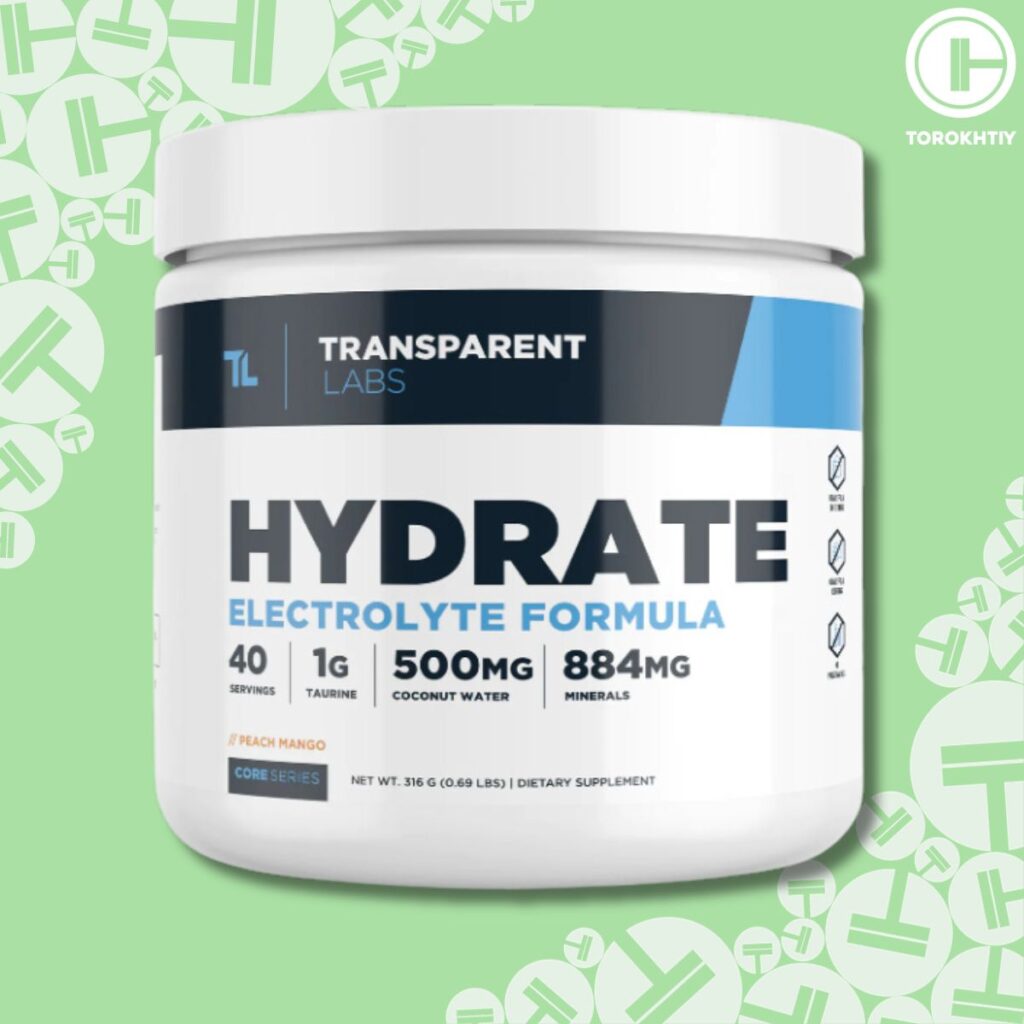
Still have questions after reading our article? Unlock your full potential by engaging with our experts and community! Don’t hesitate — leave a comment below and Oleksandr Maksymenko will provide a personalized answer and insights to help you reach your goals.